This week’s Monday Roundup is sponsored by Gorge Pedal. Save the date for July 18th!
Welcome to the week. Here are the most noteworthy items BikePortland readers and editors came across in the past seven days…
Keep your license: A bill passed by the Oregon House last week bars the state from suspending someone’s driving license based on their inability to pay traffic fines.
U.S. on wrong track: At a recent global road safety conference in Sweden the U.S. was the only country to issue a dissent to a declaration made by over 140 other countries.
Overweight, under-regulated: So great to see growing awareness of the Big SUV Problem. This article translated from Dutch says, “Yes, let’s start fat shaming those SUVs.”
How to win at urban mobility: There are a lot of aspiring politicians in Portland right now. If you’re one of them, here’s a great primer on how to defend our streets against cars.
Advertisement
Oh no, Lego: It’s sort of fun that there’s a debate about the lack of bike lanes in Lego world. But it’s also kind of sad.
Good news: The U.S. Bureau of Land Management has taken legendary Slickrock MTB Trail off its list of potential parcels for new oil and gas exploration.
Presidential plans: Interesting to note that of all the major candidates for U.S. president, Transportation For America gave passing grades only to the two who have recent experience as mayors: Pete Buttigieg and Mike Bloomberg.
Trick a Tesla: All it took was a very simple bit of vandalism to fool a “high-tech” car into thinking a 35 mph speed limit sign said 85 mph. What could possibly go wrong?
Climb in polls for climate: A new survey conducted for The Atlantic shows that for Democrats, climate change is a top political issue. The big question is, will traditional Dem talking points (“Electrification is the answer!” “They’re just aux lanes!”) finally give way to the bold policies we need?
Advertisement
Lyft’s e-bike launch in DC: This summer Portland will launch an e-bike share system that I have a hunch will look a lot like what Washington D.C. just unveiled.
Chew on this: Our friends at City Observatory crunched the numbers and found a strong correlation between the number of chain restaurants and car dependency. Put another way, there’s a reason places like Portland, New York City and New Orleans have strong food scenes: Because we drive less.
‘Bike community’ not monolithic: The only reason the story about a bike shop opposing a carfree street is newsworthy is because of the popular — yet wildly off-base — notion that there exists such a thing as a “bike community” where all people who love biking share a certain bundle of beliefs.
Research beat: Newly published research in the Journal of Transport & Health studied driver yielding behavior in Las Vegas and found that people with higher-priced cars yielded to people in crosswalks at a lower rate.
Tweet of the Week:
https://twitter.com/editorswindler/status/1229630689252741120
— Jonathan Maus: (503) 706-8804, @jonathan_maus on Twitter and jonathan@bikeportland.org
— Get our headlines delivered to your inbox.
— Support this independent community media outlet with a one-time contribution or monthly subscription.



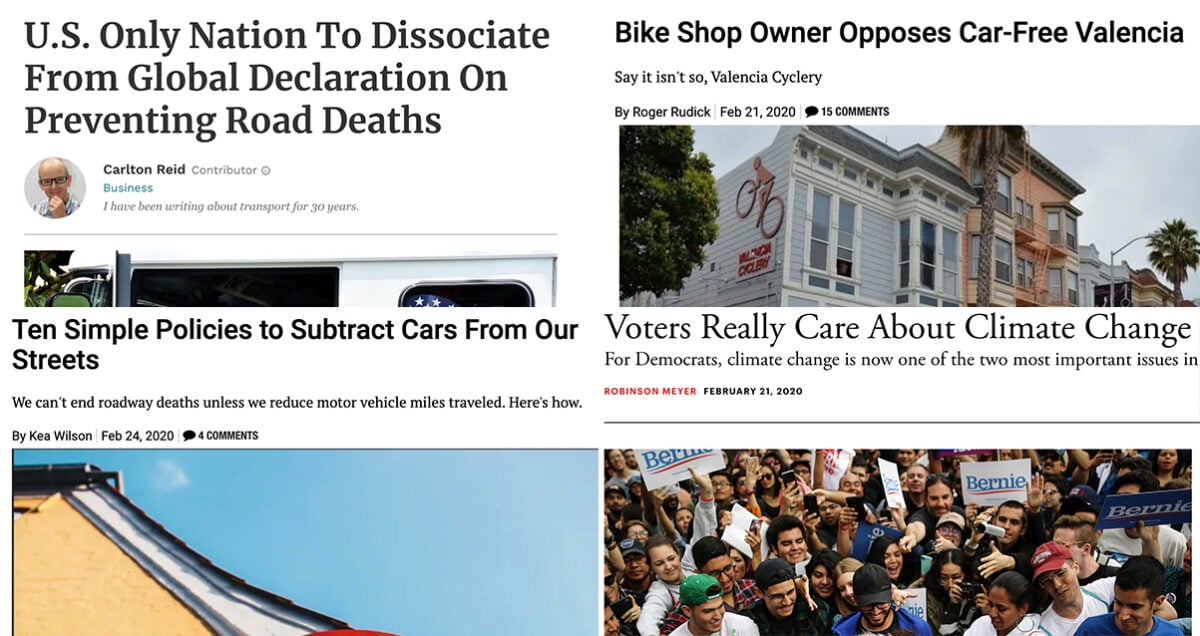
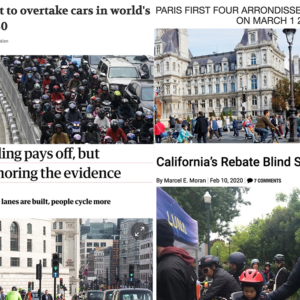
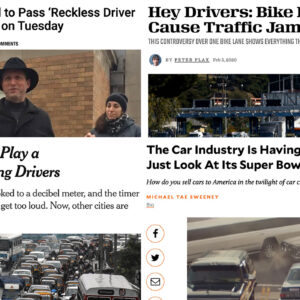
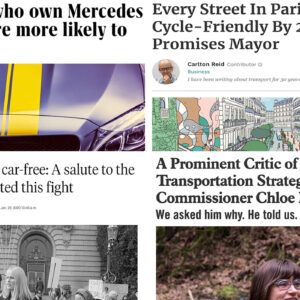
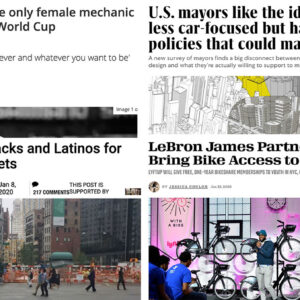
Thanks for reading.
BikePortland has served this community with independent community journalism since 2005. We rely on subscriptions from readers like you to survive. Your financial support is vital in keeping this valuable resource alive and well.
Please subscribe today to strengthen and expand our work.
The Tesla tricking road sign, is just a small taste of what would be in store for AV’s if they ever become a reality. Sure, the speed thing could be cured with some kind of digital speed mapping , but the ways that object recognition, and short term detours could be gamed for fun or profit is huge.
To be fair, humans can be tricked by modified traffic signs as well.
But you can sue the human…
You can sue Tesla as well, and they have much deeper pockets. You can also sue whomever actually committed the vandalism, and the city for having such easily vandalized signs. Hell, you can sue pretty much everyone.
Right … sue Tesla. With their deep pockets. That sounds really promising.
You want your defendants to have deep pockets.
how about ending the insanity of suspending driver’s licenses for failure to pay child support?
If you’re car-free, it has almost zero effect either deterrent, punitive or otherwise. At worst maybe it costs you an extra $44.50 (that could’ve gone toward child support) for a non-driving state ID card if you need one. Making a statement: priceless.
Anyway, I don’t think people should get to keep their licenses when they can’t afford the traffic fines they racked up. But to fix the resulting equity issue, losing your license should BE the fine. That is, no fines ever, just 3 strikes and you’re permanently out, type of thing. If we’re gonna take cars off the road, what better place to start than the people who keep f—ing up?
Yes, let’s both shame and regulate the users of antisocially large cars. In Vancouver, there was a recent collision where the driver of the standard sedan may have survived if she hadn’t been hit by someone else driving a raised, full-sized American pickup truck. It should not be legal to manufacture, sell, or drive a vehicle that can decapitate the occupant of another vehicle let alone be a pedestrian death device. There is way, way too much freedom of automotive choice!
I’m all on board if we also make recumbents illegal.
Why would you want to make recumbent bikes illegal?
Deadly decapitation danger.
“Why would you want to make recumbent bikes illegal?”
MotRG may or may not actually want to do that. But what he most assuredly wants is to launch false equivalences into these conversations. He thinks it is droll., no matter how far fetched, implausible, wrongheaded.
You seem like a conspiracy theorist – I just don’t like them.
I observe your posting proclivities. No conspiracy required.
PS you don’t like conspiracy theorists, or you don’t like recumbents?
Because they look silly?
The obvious difference being that recumbents pose no meaningful danger to other road users. It’s the same reason we usually laugh at attempts to legislate “distracted walking”
Certainly true, but society regulates all sorts of behaviors whose primary dangers are to those undertaking them.
I absolutely don’t support banning recumbents (deadly decapitation danger notwithstanding), but if bicycles are as dangerous as some suggest, perhaps society has an interest in regulating their use just as we do with other vehicles that do not offer sufficient protection in the case of a crash.
I can’t cruise around on public streets in my golf cart, for example.
If bicycles were as dangerous as some suggest, it wouldn’t be possible for people who ride them to live several years longer on average than the people who don’t, but that’s the reality.
Maybe we can take your off-hand suggestion just a bit further and mandate that everyone must ride bikes. Everyone will live longer because of the magical benefits of cycling and I think there might just be some other benefits.
There are many different kinds of recumbent bikes – tall ones as well as short ones. MotRG’s trolling comment disregards this fact, and draws a false equivalence between a 5000-lb truck that can kill or maim many people, and a recumbent bike that can do nothing even remotely similar.
Also many people switch to recumbents after they have flipped over the handlebars of a regular upright bike, so I’d like to see the stats on safety of upright bikes vs recumbents. I’d wager there is no significant difference.
A recumbent with a skin makes me remember Kirke Johnson and the bright orange/yellow pattern of his fabric fairing…
I regularly see several people with disabilities using recumbent bikes of various types on the Willamette Greenway Trail. I’d guess at least some of them may not be able to use a standard bike . I only know about their disabilities from seeing them getting in or out of vehicles in the parking lot before or after riding.
We, meaning 21st century America, as a society refuse to regulate the means of transportation–private cars–that cause the most damage, because we hold it culturally sacred. We let the sacred cow create all the hamburgers it wants to.
I think “culturally sacred” is much less the issue than the fact that our transportation infrastructure, as well as much of our economic activity, is built around automobility. Transit can replace some of it, bikes and walking can replace a sliver, but the reality is that moving away from cars is going to require a huge societal investment, including the likely abandonment of large swaths of our suburban and exurban areas, reconstruction of our cities, and development of new technologies.
I agree with the assessment that our infrastructure is currently built around the notion of direct point-to-point personal mobility. That still does not equate to needing SUVs to accomplish the goal of getting a person from A-to-B. Much smaller, lighter weight vehicles could achieve the same thing for all but a very few bulk-hauling trips. Even bulk hauling would be better served by an occasional-use box truck or minivan.
I agree — smaller vehicles can work, and I think are inevitable as we move to electrification and automation.
Lyft’s e-bike launch in DC, I’m not a fan of ride share platforms Lyft and Uber. However, I think that the Biketown bikes really miss out by being big, heavy lugs. You could say they are safer that way, but there’s so many electric options, that argument falls flat. I think Biketown should do e-bikes.
I wouldn’t hold my breath on the quick roll-out of shared e-bikes or e-bikes in general as the Corona virus will probably blow a hole in the e-bike supply chain the size of the moon. It is at least possible to put together a regular pedal bike ( not a cheap one) with parts from the U.S. and europe , but the drive trains of nearly all e-bikes are almostly exclusively manufactured in China. To be fair this is probably somewhat true of automobiles too with almost all new cars containing at least a few critical parts from a Chinese supply chain.
Well, it’s a good thing that the local shops have a good supply on hand.
I rode Lyft’s electric bikeshare (now defunct in SD) bikes daily for a week San Diego last summer and they were great. It was a great riding experience and I didn’t feel like I needed any special clothes/gear (I did pack my helmet) and showed up fresh as a daisy. The downside was they used a per minute structure, and I was shocked to see just how much of a bill I had tallied for myself in 5 days of relatively short trips. I wonder how much of these costs lead to the service being mothballed.
I worry introduction of electrics to the fleet could lead to a few negatives:
• Increase the price of monthly/Annual Memberships
• Make finding a nearby non-electric less likely
• Reduce maintenance to non-electric (as the electrics will be far more popular)
• Make commuting by bikeshare out of reach for many people due to cost
• Fewer available racks on the Max/Buses due to decrease bikeshare use by multimodal commuters (like myself)
Current Annual Membership = $10/month, 90 minutes a day
• 2 trips per day (to and from destination) X 5 days = 10 trips a week
• 4 work weeks in a month = 40 trips a month
Total Monthly Cost for a daily RT commute = $10 a month
If ‘DC Style’ pricing comes to Biketown
Annual Membership = $10/month, 90 minutes a day
• $1 per ride = $2 per round trip
• $20 extra per week, $80 per month
• $10/Month Annual Membership
Total Monthly Cost for a daily RT commute = $90
I suppose on the flip side, that’s $1,080 worth of annual maintenance to a personal bike that could go to a local bike shop. Certainly something to ponder with so many shops closing lately.
A daily bikeshare/Max commuter, such as myself, will see an increase of $80 a month (an 800% increase if online calc tools are to be believed)
I’m fortunate to have an employer sponsored TriMet pass but if I didn’t, that would be another $100 per month. That’s $180 for a month of commuting without a car.
• $180 @ ~$3/gallon = 60 gallons of gas
• 60 gallons @ 25 mpg = 1500 miles = 37.5 miles daily RT car commute (other car costs not included)
Tough economics to entice folks out of car commuting, especially in the more moist NW months
I think electrics are important to growing the number of users in our bikeshare system/bike network, but just thought I’d throw some. The current bikes are heavy, but they’re cheap to use and plentiful (if you’re in the central city). What we really need is a bigger service area or perhaps just lighter non-electrics. I would think dockless tech has improved since the launch several years ago.
OK? End of Bikeshare Cheerleading comment 🙂
Ironic that the city observatory article mentions New Orleans in terms of correlation between food and driving. In all of my experience, that’s explicitly not the case for New Orleans, they drive everywhere!
Further, I would posit that given the dearth of grocery stores (vast swaths of New Orleans are food deserts) combined with a historically low cost of living and low cost of food items like sea food has allowed small neighborhood restaurants to survive, and the food scene to remain vibrant.
But otherwise, New Orleans is a city of cars, not cyclists.
Per US Census 2018 ACS:
NOLA: 3.5% bike commuters
PDX: 5.3% bike commuters
NOLA is just the dyslectic cousin of PDX.
Not only is the “‘Bike community’ not monolithic,” neither are most ‘communities’ that are cited in our social and political conversations. This community and that community (Black, Latino, Gay, cycling or whatever) are typically labeled by those of us who are outside of those groups, often in an attempt to curry favor to the benefit of whatever cause, service or product we’re trying to promote.
Labeling groups as “communities” and thinking of them as monolithic blocks allows people to be lazy. If you’re a City agency or a reporter, it’s easier to label all cyclists, members of a race, etc. as a community, then give one of their “spokesmen” a call to get the opinion of the entire group than it is to actually find out what all the various opinions may be of many people in that group.
I think it’s even worse… It’s a form of “othering”. Your community has a variety of viewpoints, but those people can be reduced to one token opinion that somehow represents them all. This is especially true for groups bounded by arbitrary lines, as opposed to self-defining groups of affinity.
Keep your license: If we’re concerned about traffic fines disproportionately affecting the poor wouldn’t a better solution be to switch to a point based system and no fines or maybe scaling fines based on income?
It is my goal to have traffic fines disproportionately affect dangerous drivers, but with our current enforcement regimen, they don’t really affect anyone.
The study connecting driver compliance with stopping for people at crosswalks and car price builds on research that Dr. Tara Goddard conducted while she was at PSU – she studied drivers’ racial bias in crosswalk compliance, road rage interactions between drivers and cyclists, how crashes involving cyclists are reported by the media, and the age at which the gender disparity in cycling begins.
BP has reported on her work before:
https://bikeportland.org/2013/04/18/psu-researcher-delving-into-multimodal-road-rage-85628
https://bikeportland.org/2013/05/27/for-girls-on-bikes-new-research-shows-a-turning-point-age-14-87307
https://bikeportland.org/event/trec-seminar-a-study-of-driver-attitudes-and-bias
Shared electric recumbents?
My big takeaway from that Tesla article is that the people who created the AI for the “autopilot” feature apparently didn’t program anything resembling a Basic Speed Rule into it… Surely a street posted at 35 MPH max can’t safely be driven at 85.
Why do we allow jacked up pickups on the road? They are death for anyone they come into contact with.
I am really concerned about the size of pickup trucks on roads. When I drive, I typically drive alone in a Mazda CX-9, which really is too big for 99% of the driving I do, but its the car I have and I don’t propose changing it anytime soon. This morning I parked that big vehicle next to a Ford F-250 pickup truck in my gym’s parking lot, it made my large vehicle look like a sub-compact (which really is the kind of car best suited for 99% of my driving). Admittedly that F-250 had a large toolbox in the truck bed, so there is a chance it was being driven by someone who actually needs a pickup truck, but I am not convinced that 99% of the driving done by F series pickups and similar couldn’t be done by Ford Ranger or smaller pickups. If my Mazda were in a high speed collision with an F series or similar sized truck, I am pretty sure I would be a road traffic fatality statistic, which may be a reason why soccer moms are buying bulkier vehicles than they actually need.
Unless and until it becomes a lot more expensive to drive a large vehicle than a small vehicle, Americans will continue to buy these huge vehicles and auto makers will continue to make them. Incidentally, I never see anything larger than a Ford Ranger on the roads in Australia or New Zealand when I visit those countries – they’re just not available at a price motorists there can afford.
“Why do I have to pay to use TriMet on days when street parking is free? ”
Street parking is never free. It’s just the city is subsidizing it for drivers.
Which is prolly a ploy by PBA to get people to come shop on a holiday.
Is that really true? On an existing street (I’m picturing a “normal” residential street), would it be cheaper to keep or remove parking? The way I see it, maintaining parking is saving money –it’s almost as if parking is subsidizing the city.
“Why do I have to pay to use TriMet on days when street parking is free? ”
Going back to that question, it’s a good one. If the idea is supporting downtown retail by making things easier for shoppers (by not charging for parking) a shopper is just as much a shopper if they’re arriving by bus as by car. So free parking isn’t an incentive for shoppers to come downtown so much as it’s an incentive for driving instead of taking the bus.
Unless they shop somewhere else because it’s easier to park.
Oh, it will always be “easier” to park anywhere other than downtown. But I think the point that q is making is, free parking only encourages driving, it doesn’t encourage shopping.
I can’t say for certain how the traffic is characterized, but a lot of it is cut through and a lot of it is office workers. With all the “homeless and druggies” downtown (as *they* do like to say), I disagree that the “shopper” demo shops there.
Yes, when I think of “free parking” days downtown I assume that means traffic jams and no parking available–good reasons to NOT drive downtown that day for shopping or anything else.
It’s a little known (and somewhat disputed) rule that when you get your Free Parking, you can pick up the big pile of cash sitting in the middle of downtown.
WAT?
#monopoly
Advance to Go, collect $200.
You know, every once in a while I see a rainbow out my office window—finding out about this “pile of cash” makes me think that must be where it ends!